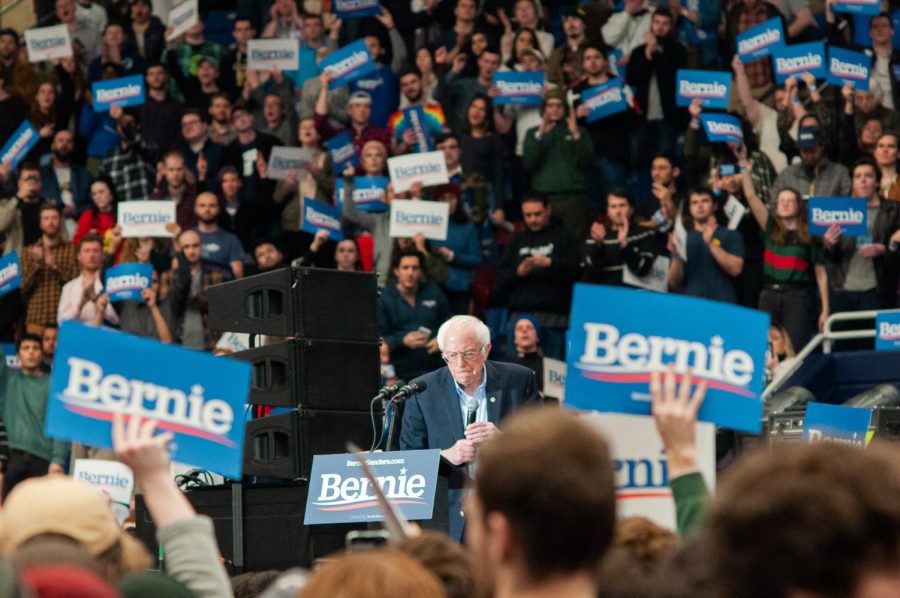Bernie Sanders’ campaign slogan is “Not me. Us.” But who exactly is the “Us” he’s referring to?
Sanders focuses his campaign on taking on the wealthy and corrupt “one percent” of America. Sanders might be the guy to take down the one percent, but is he the guy to win over 50 percent of American voters?
The real divide in America that ultimately decides elections is that roughly half of us will vote conservative and half will vote liberal. The core issues with Sanders are that he’s too progressive to represent the Democratic party and that he lacks support from his own party. In a political climate that is begging for someone to unify the country, Sanders makes us more divided.
He has promised to enact an environment saving plan, cancel college debt and make healthcare free once and for all. After four years of Trumpian torment, Sanders swoops in to save the day like a Democratic dream-come-true. More, there was worry Sanders was unelectable, but today he holds a comfortable lead in national polls and the Vermont senator is responsible for shifting Democrats to a more progressive agenda. This all sounds good, but my concerns lie in what Sanders could do in an election against Donald Trump, and if elected, how much he could accomplish as president.
It’s important to imagine what a Sanders nomination would be like. On the Democratic side, you have a progressive revolution led by Sanders. On the Republican side, you have another political revolution led by Trump running on four years of momentum. An election between two competing movements creates a polarized environment that Trump would thrive in. This forces voters to choose between two extremes, putting a majority of Americans, who are moderates, in a difficult situation. When the options are such radical candidates, a majority of the country becomes unrepresented. Our polarized government would become further divided. Almost any other candidate would provide a more moderate option. The most important thing to Democrats, and this writer, is beating Trump, not necessarily having the political revolution Sanders promises.
My other concern with Sanders is how much he could really accomplish as President. Sanders has very little support from his own party. Elizabeth Warren, Michael Bloomberg and Joe Biden all bolster more support from Democrats than Sanders. Granted, this is one of the appeals of Sanders — he’s an outsider with different ideas from traditional Democrats like Biden. However, party members today rarely cross the aisle, so if you don’t have support from your own party, any proposed idea will barely get off the ground. Our gridlocked congress will become even less effective if our president can’t agree with their own party, let alone the other major party.
Sanders’ determination to follow his own agenda is worth some praise, but his reluctance to compromise is problematic. Real progress is made through finding a middle ground, and Sanders doesn’t want to budge on any issue. He wants it Bernie’s way, and his unwillingness to support Hillary Clinton after losing the nomination in 2016 is evidence of that. I want a president who can beat Trump, but to get there the Democratic nominee will need to represent more people and be better at working with others.
Maxwell Zeff is an assistant Op/Ed editor and can be reached at [email protected].





















Jon • Feb 26, 2020 at 12:01 pm
Bernie did 39 rallies in 13 states for Hillary in 2016 over the last three months of the 2016 general. The idea that he did not support her is ludicrous. The Overton Window in this country has been shifted so far to the right that sensible policies such as universal healthcare are somehow painted as unreasonable. Bernie is an excellent organizer and has proven that he can motivate people to go to the polls this election cycle.
Also, explain to me how Bernie, who is leading in most polls, and has won all three primaries/caucuses so far, has little support from democrats. You know, the people who actually vote. He has very little corporate support, that’s for sure.
Adam Lechowicz • Feb 26, 2020 at 11:34 am
“ his unwillingness to support Hillary Clinton after losing the nomination in 2016“
Is hosting 39 rallies in 13 states in support of Hillary Clinton during the three months leading up to the general election what you would call “unwillingness”? Whether or not Clinton appreciated his help, let’s be clear about the facts here.